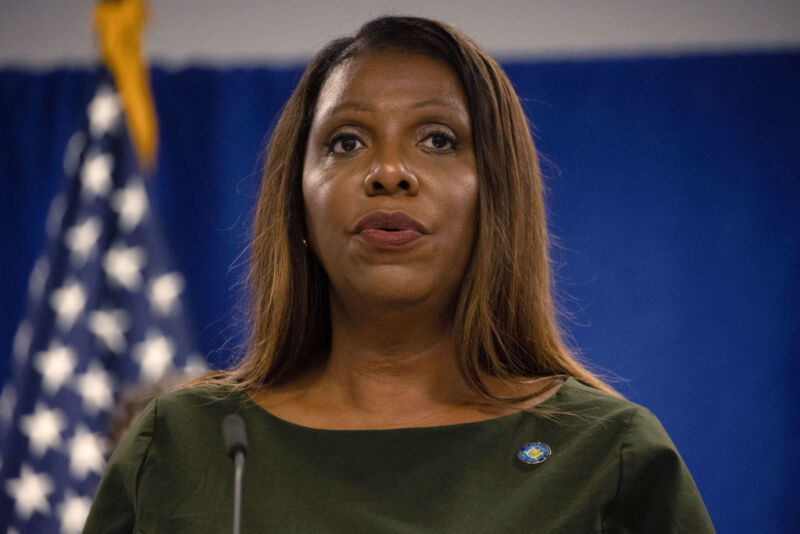
On a mission to stop young men from being increasingly radicalized online, New York Attorney General Letitia James suggested today a new strategy to stop online hate from spreading: Punish anyone who reposts content created by those who commit homicide.
Her potentially First Amendment-infringing policy reform recommendation comes after the Bureau of Internet and Technology and the Hate Crimes Unit of the Civil Rights Bureau conducted an investigation into how online platforms—including Reddit, Discord, 4chan, 8chan, Twitch, and YouTube—helped a white gunman prepare and then murder 10 Black people in Buffalo, New York, during a mass shooting in May.
According to the Office of the Attorney General, the gunman's content, including snippets of his manifesto, was shared across mainstream platforms like Facebook, Instagram, Twitter, and TikTok. Among other solutions proposed, James and New York Governor Kathy Hochul announced that they want lawmakers to establish a civil liability so that no one shares extremist content, which can potentially inspire copycats.
Discord provided Ars with a statement, "We created Discord to be a place for people to find togetherness, and hateful ideologies and actions are in direct opposition to our mission."
"We have worked closely with the New York Attorney General over the course of the investigation," Discord's spokesperson told Ars. "We know we must do more to keep hate, violence, and extremism off of our platform and are actively collaborating with partners on tools and techniques to strengthen industry moderation practices and policy transparency. Our work here never stops."
Meta said it supports standardized approaches to content enforcement that could make clear what content is prohibited, holds companies accountable for enforcing policies, and improves transparency.
"There is no place on our platforms for terrorism, extremism, or any promotion of violence or hate," a Meta spokesperson said. "We constantly work to prevent the abuse of our services and are committed to keeping people safe on our platforms."
None of the other platforms could be immediately reached for comment. James' office also did not immediately respond.
Section 230 reforms recommended, too
After reviewing "thousands of pages of documents and social media content to examine how the alleged shooter used online platforms to plan, prepare, and publicize his attack," James' office also reiterated some more commonly proposed solutions to hate content spreading online. Those include old standards like requiring more transparency on content moderation and stronger content moderation efforts from social platforms.
But James' recommendations also included some other suggestions less commonly considered these days. In addition to imposing civil liabilities on users, James also went after the platforms. She recommended legal reforms to hold platforms liable for hosting extremist content and new laws requiring livestreams to be delayed so that moderators have a cushion to remove infringing content before it goes live.
To push the reforms, James explained, would require amending Section 230, which currently protects platforms from such liabilities. But she said it doesn't have to stay that way.
"Congress should rethink the ready availability of Section 230 as a complete defense for online platforms' content moderation practices," James said. "Instead, the law should be reformed to require an online platform that wishes to retain Section 230's protections to take reasonable steps to prevent unlawful violent criminal content from appearing on the platform."
This, James said, would change the default mode so that companies like Meta or Twitch have "the initial burden of establishing that its policies and practices were reasonably designed to address unlawful content."
Not everyone agrees with James on reforming Section 230 and penalizing users. Tech policy coalition Chamber of Progress CEO Adam Kovacevich posted a statement saying, "Penalties for creating homicidal posts have the potential to slow the spread of violent content online. But the AG's proposal to change Section 230 to prevent the spread of violent content misunderstands that Section 230 already protects and encourages content moderation. The best way to protect content moderation is to protect Section 230, not to gut it."
The New York AG's report also challenges long-upheld First Amendment protections for both platforms and users sharing extremist content. She suggested that Congress, the State Legislature, and the platforms could take action to hold anyone accountable for proliferating hate speech online.
Among lawmakers endorsing James' recommendations was Buffalo Mayor Byron Brown, who explained the role platforms played in allowing the Buffalo shooter's influence to spread online easily.
"A growing number of violent attacks on communities start with hate speech online," Brown said. "It's far too easy for individuals to become radicalized and indoctrinated with a hateful ideology through the Internet. The [May 15] mass murderer researched his Buffalo target, spread this hateful manifesto, and livestreamed his murders with disturbing ease. Much more must be done to ensure that there is no place on the Internet for hate speech, for hate indoctrination, for spreading hate manifestos."
reader comments
245